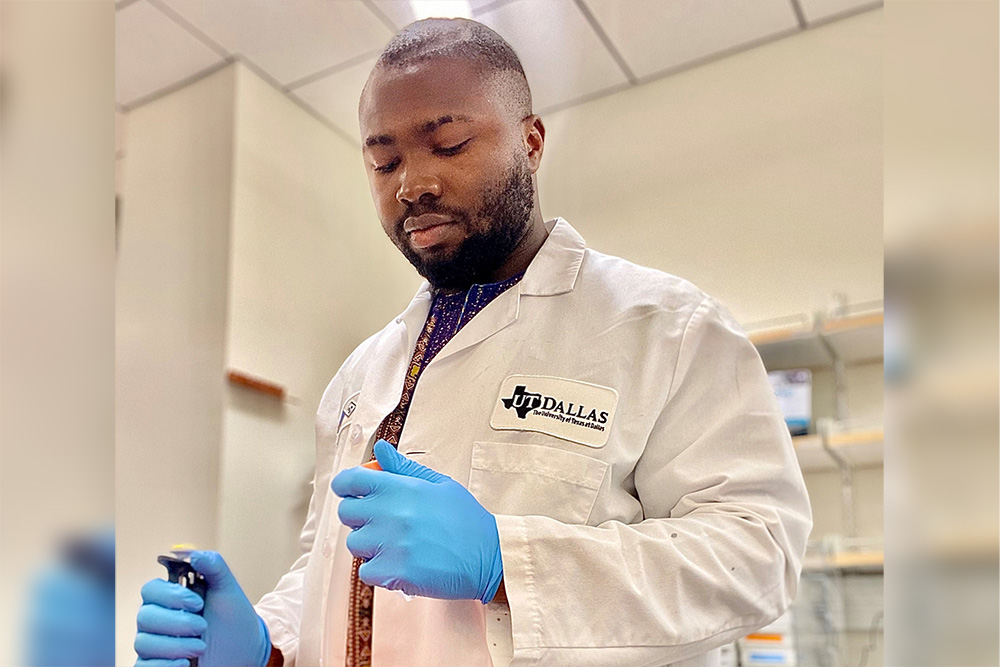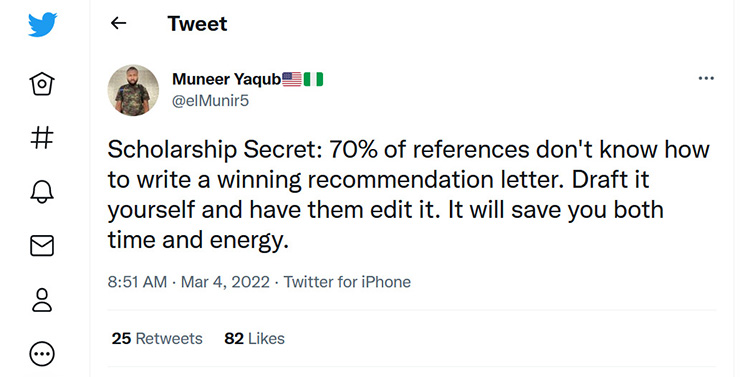Comet Offers Wisdom to World of Prospective Graduate Students
By: Phil Roth | March 25, 2022

A University of Texas at Dallas student is sharing what he has learned about graduate school with undergraduate students all over the world, providing advice that he hopes will help gifted international students find a place in the United States.
Muneer Yaqub, a molecular and cell biology doctoral student from Nigeria, has gained a significant social media following from African students — as well as students from other parts of the globe — by giving them tips on how they can pursue their graduate studies at U.S. universities.
“There was a knowledge gap, and I wanted to bridge that gap. After I was admitted to UT Dallas, I felt I was in a position to start talking to people about opportunities to study abroad,” he said.
Many doctoral programs in the U.S., including UT Dallas’, provide funding and teaching assistant positions for students who are invited to enroll in their programs. That funding mechanism created an opportunity for Yaqub to enroll at UT Dallas. But he said details about such programs — and the application process — are often unclear to potential international students.
“I did not come from a rich background that allowed me to finance my education, so I tried to find out if I could join a fully funded graduate program in the United States. I kept asking on social media until I could find the answers to my questions,” he said. “I felt that this information should be shared.
“There are people in Africa who have a perfect GPA but do not know that these types of opportunities exist for them. Or they think wrongly that a master’s degree is required before applying to a doctoral program. So, I wanted to reach out to those kinds of people with information.”
Yaqub uses various social media outlets to share his graduate school advice; his Twitter feed has more than 42,000 followers, and he recently added a YouTube channel.
Because he spends so much time working toward his degree, he is not able to give individual advice to most of his followers. However, Yaqub has identified a few students for whom he provides one-on-one support through a WhatsApp group or a Zoom meeting.
iWeek 2022
UT Dallas will celebrate its global diversity during iWeek from March 28 to April 1. Programs and events will showcase international culture through food, music and performances.
“I find students who are really serious about this, and I talk with them individually,” he said. “I feel so much responsibility as to how they are doing and if they get accepted. Their success is my success.”
For Yaqub, mentoring is an important part of his life. As an undergraduate student in Nigeria, he worked as a journalist and provided advice to other journalists. As a graduate student at UT Dallas, he also mentors undergraduate students in the lab run by Dr. Nicholas Dillon, assistant professor of biological sciences in the School of Natural Sciences and Mathematics.
“I feel I have a responsibility for mentoring. Whatever I know, I want to share with other people,” he said. “That cuts across every aspect of my life.”
Dr. Juan González, vice provost for global engagement, dean of graduate education and holder of the Francis S. Johnson Chair for Graduate Education, said Yaqub’s mentoring of potential students fits well with UT Dallas’ international outreach.
“It sends the message that we are a welcoming place, that we already have a base of African students and a surrounding community of people from Nigeria, Kenya, Ghana and South Africa, and that prospective students will feel welcome here,” he said.
“I feel I have a responsibility for mentoring. Whatever I know, I want to share with other people. That cuts across every aspect of my life.”
Muneer Yaqub, a molecular and cell biology doctoral student at UT Dallas
Yaqub hopes to earn his doctoral degree and eventually become a university professor, where he can continue mentoring students. In the meantime, he is pleased to be part of the UT Dallas community.
“I often see people who look like me here, which isn’t as common at other universities,” he said. “I like the fact that UT Dallas is an international community with a sense of belonging, which is priceless. It feels like home.”
Media Contact: Phil Roth, UT Dallas, 972-883-2193, phil.roth@utdallas.edu, or the Office of Media Relations, UT Dallas, (972) 883-2155, newscenter@utdallas.edu.






